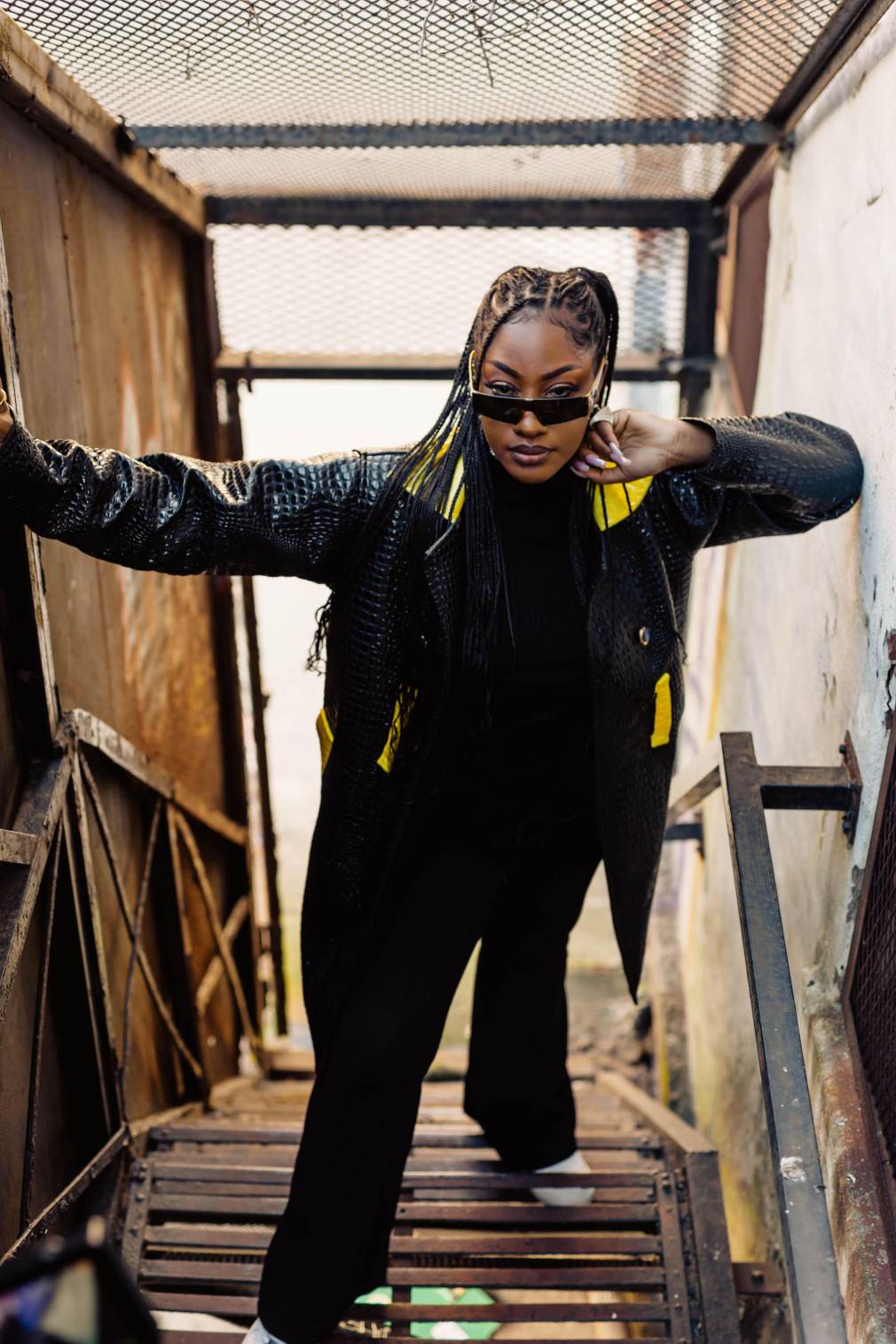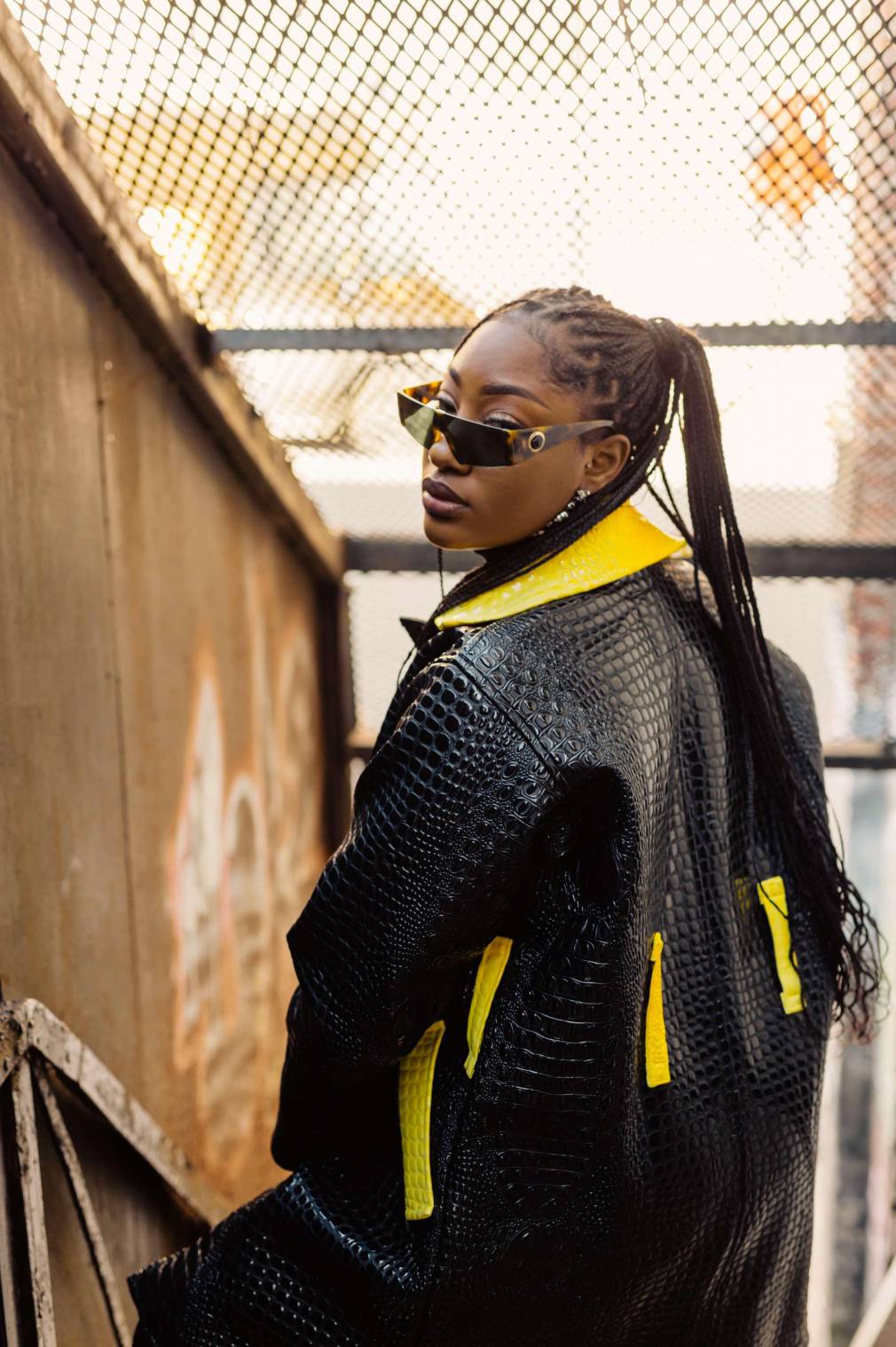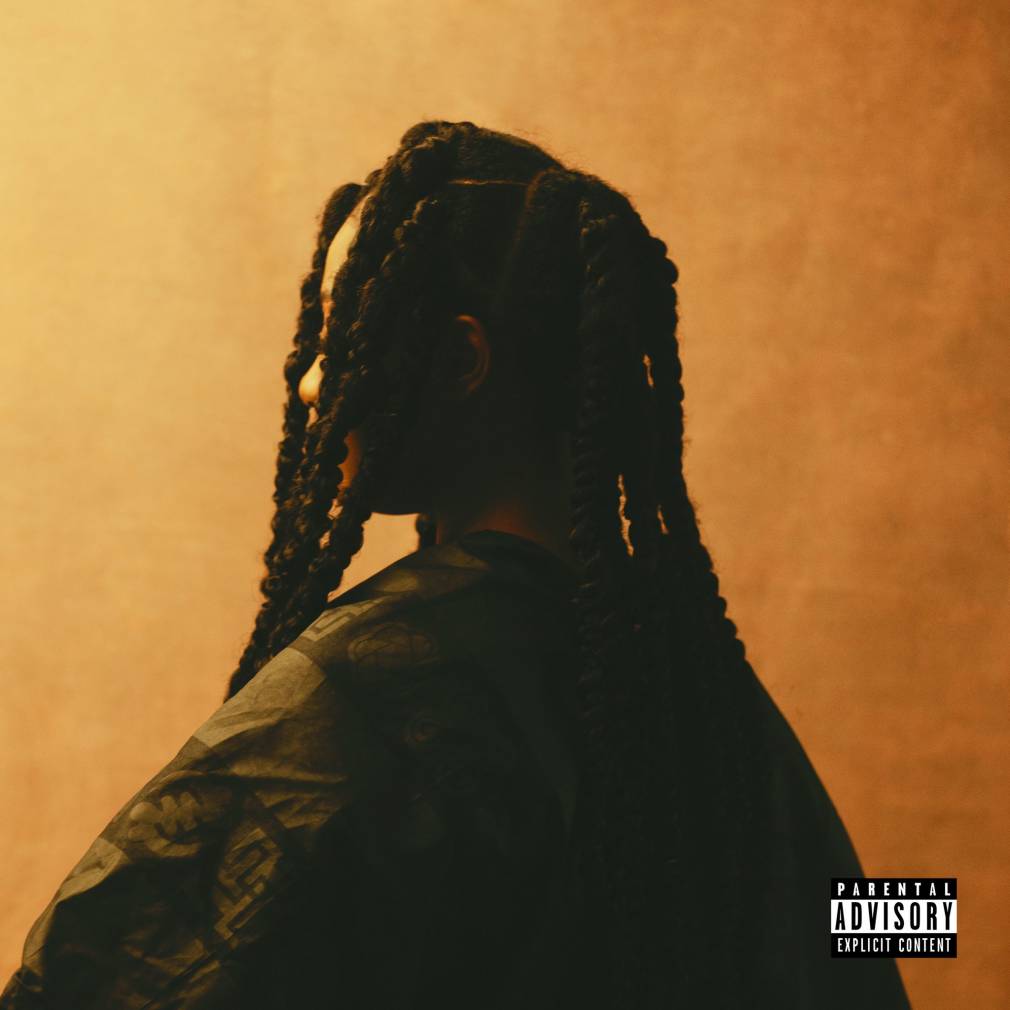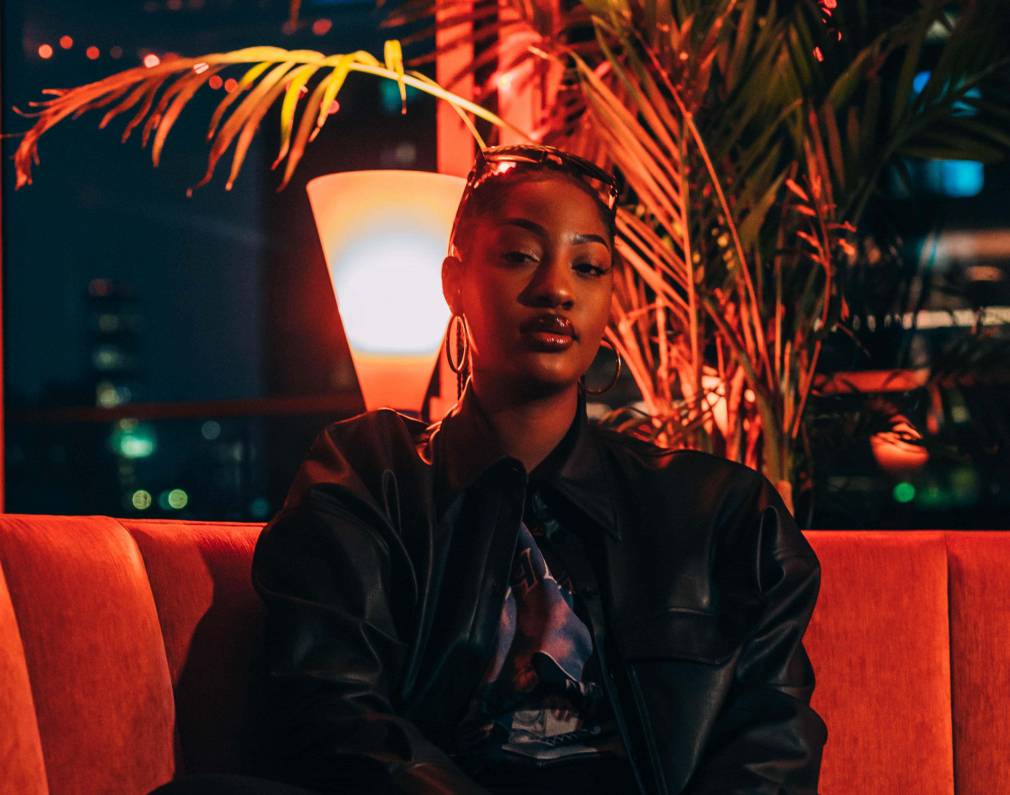In July 2018, the singer born Temilade Openiyi hesitatingly released “Mr Rebel” as her first song online after a long bout of clandestine creation uncertain of her voice’s distinctive sound. The cut, which she describes as “the worst song on my laptop that I could release comfortably and know it wouldn’t be so big as it’s not that great” was instantly met with critical acclaim.
Growing up listening to the likes of Amy Winehouse, Asa, Frank Ocean, Beyonce, Tems’ desire to fully take on music did not crystallize until her teenage years. Though her parents insisted she continue her Economics studies in South Africa, Tems casually made music on the side and even opened for South African rapper, Cassper Nyovest. Her penchant for self-production stemmed from a lingering discontent with other producers’ results, “I wanted to have my own sound wholly. I needed to share what I feel music means to me and the only way I could do that to the fullest is learning how to produce.”
Records like “Looku Looku”, “Damages” depicts Tems’ knack for conveying emotions through anecdotes and personal experiences. “All my songs represent different seasons of my life that I’ve experienced and I want to share that with my listeners or anyone going through anything and needs some type of healing,” she says.
With just a handful of releases including her 2019 smash hit “Try Me”, a Headies nomination, her legion of fans called Rebel Gang, Tems has become one of the few breakout talents from Nigeria in the past year. In May, Tems was handpicked as one of the beneficiaries of Youtube’s Foundry Program, alongside artists from the UK, France, US, Japan, Mexico, Australia etc. Try Me is also the soundtrack for the program’s introductory video this year. In September, Tems became Spotify’s third RADAR Africa artist following South African artists Elaine and Willy Cardiac on the global RADAR program.
We sat with Tems to discuss For Broken Ears, her meteoric rise, the pressure to maintain momentum, her take on success…
Did you envisage this upward trajectory within a relatively short period?
Actually, I didn’t. When I released “Mr Rebel” in 2018, I just wanted to have a song out because I thought I have been singing for so long and didnt have a single song online. I felt the need to put at least something online and two years later, here I am. Unbeknownst to many, “Mr Rebel” is my first song that I put online.
When did you realize that music is what you’d want to be doing?
Since I was about 6, I’ve always known music is something I loved but I wasn’t thinking about a career until I was 17. Then, I knew music was what I wanted to do but I had to go to school. I knew I would however go straight into music after school.
Do you assume you did anything differently to garner momentum without having to release as much music prior?
Honestly, when I say it’s God, people think I’m crazy but the truth is, there was no plan or promo whatsoever – I was just going with the flow. I knew nothing about the music industry, I didn’t know anybody. I just uploaded “Mr Rebel” and some media platform reached out. I went there all by myself from my house. Up until I released “Try Me”, I didn’t have a manager even.
Which artists did you listen to prior and how pronounced is their influence on your creativity?
I listened to Asa, Aaliyah, Lauryn Hill, Frank Ocean, Amy Winehouse etc. I wouldn’t say they influenced my sound because in finding my sound, I had to stop listening to music for a while to be sure what I really sounded like without the influence of anybody. For two years, I could hear music but I wasn’t absorbing it.

Have you always embraced the distinctiveness of your voice or was that a process?
When I was much younger, my voice was different. A lot of people around me thought it wasn’t nice and discouraged me from singing. I just really liked music, I didn’t know whether or not I was good but that wouldn’t stop me. At 17, I realized I might have something, it might not be like everyone else’s but I do have something.
Nobody helped you through reaching that point?
Not exactly. Everything I did – the training, creating songs – I did secretly. I didn’t really tell people that I sang. It was just something I liked to do on my own. It wasn’t something I’d discussed to anyone, honestly.
How did the penchant for producing your own music come about?
I couldn’t find anyone that understood my sound and what I was looking for. Working with producers is amazing but in a way, you’re working with their sound not yours. It’s like a fusion of both of your sounds, which means that you’re dependent on them to give you a certain thing. I wanted to have my own sound wholly. I needed to share what I feel music means to me and the only way I could do that to the fullest is learning how to produce. I needed to know how to be able to translate my sound throughout the music process ranging from production, writing, vocals etc.
What was the creative process of For Broken Ears like?
Each song represents different eras of my life. I’m the type who goes through different things. It’s a journey and all the songs represent different seasons of my life that I’ve experienced and I wanted to share that with my listeners or anyone going through anything and needs some type of hope, healing etc. “Interference” is like a welcome to my world; there’s love in it. There’s “Ice Tea”, which is about me trying to serenade someone saying I’ll turn whatever bitterness, sadness, anger that they have into something sweet. “The Key” embodies my take on life and just what my own philosophy is. It’s really about me, having gotten rid of my damages; this is the key to my life.
How did the title come about?
The project is for people that haven’t really had any music to help them heal or touch their spirit. People who just listen to dance and groove, and not to also replenish themselves. Doing all that is great but I just felt like I wanted to provide some kind of relief to anyone who’s listening, hoping it does a reset on their minds or heal them. That’s why it’s called “For Broken Ears.”
What record was the most challenging to make in this project?
“Free Mind”; I almost gave up on it but I knew if I didn’t release it now, I probably never will.
Which record means the most to you?
I’ll say “The Key”. Just because it was me saying what my truth is. I’m just here for the people that can connect with me, not to be liked by everybody. I’m here for the people that can read the hidden messages that I send through my music. I’m in this world but not here for the world. I’m here for another purpose which is to relieve people going through things. Anytime I hear “The Key”, it just reminds me of the state I was when I recorded it, it reminds me of why I’m here. I’m concerned about my own goal, purpose and not what people think of it. That’s where I’m at and “The Key” is an embodiment of that.
“Try Me” is a powerful, possessive, personal song. Did some personal event trigger the birth of that song?
Yes, all my songs are personal and I literally sing them from my spirit. The state of mind I was at when I made “Try Me” was very deep, I can’t explain. I had gone through a lot and felt people just like to kick you when you’re down and I was done with that. Honestly, you have to be going through a lot for you to make a song like “Try Me”. It’s not a song you just make being happy or normal else someone would’ve made a “Try Me” before me, if it was such an easy song to make. That state of mind is some place I don’t know if I can ever go to again because I’m not angry or suffering anymore. I know it’s a great and empowering song but I don’t want to go back there. My next songs will be different because I’m in a different place.

What do you aim to evoke with this project?
I want to set the tone in terms of my sound because I feel people probably don’t understand it. This is my way of saying I’m everything and can do anything in terms of making all kinds of music. When I started making music, I didn’t know about genres, I just did anything and everything. I knew obviously about Afrobeats but it is when I came into the industry that I realized people classify records into R&B, Soul etc. This project is aimed at showing my range, what I can do, the level I’m on etc. The project also doesn’t quite summarize the things I can do as they can’t all fit into it. I also want to identify where my fans are at, who they really are; that’s why I let “Try Me” stretch out for a bit because I needed people to lose hold on it, I needed them to be disappointed. Nigerians feel pressure for you and they want you to feel pressure but I can’t feel that because I know who I am.
How did you manage the pressure to maintain “Try Me”’s momentum with subsequent releases?
People feel pressure for you, that’s what this whole thing is. They’re looking for something to entertain themselves with, so you can’t allow that pressure to come in. I don’t entertain them because it’s not my business, it cannot come into my house. It’s almost like there’s a war happening outside my house but inside my house, I’m at peace, in my space, chilling. I think people want artists to feel pressure. First of all, I’m an artist, I make art, there should be no pressure in making art as it’s a form of expression and music is what I use to express myself.
What does success mean to you?
Success means millions of people being aware because I’m a part of creating that awareness of self and impacting them. Not an impact that they worship me but one where they find themselves by listening to my music. Success means that I can make direct impact in things that are happening in Nigeria, Africa beyond just tweeting online. Also, creating opportunities for people is success to me.
As a self-produced artist, which other producer do you think you would create magic with?
Spaxx is one of my main persons when it comes to producing. I’ll also like to work with Sarz and Jae5, I think it’ll be really cool.
What makes Tems a different type of artist?
I try to be as real as possible. I’m honest about my feelings, who I am and I’m passionate. There’ll always be music for different types of people but I’m never going to conform. Whoever that can connect to what I create will connect to it. I don’t need accolades or whatever, it’s not why I make music. I just want to share my music; that’s why I uploaded “Mr Rebel” and that’s the only thing important to me.

Streetwear Credits
Creative Direction: Amarachi Nwosu (@Amaraworldwide)
Photography: Jerusa Nyakundi (@JerusaNyakundi)
Production: Melanin Unscripted (@MelaninUnscripted)
Fashion Editorial Credits
Creative Direction: Amarachi Nwosu (@Amaraworldwide)
Photography: Jerusa Nyakundi (@JerusaNyakundi)
Styling: Rey Jaiteh (@reyjaiteh) & Zaawdi (@Zaawdi)
Production: Melanin Unscripted (@MelaninUnscripted)




